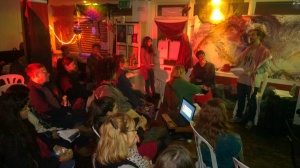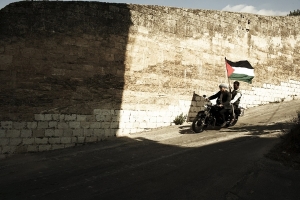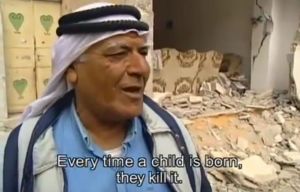By Anthony Killick.
The Brighton Palestine Film Festival is one of the latest contributions to the worldwide proliferation of film festivals dedicated to Palestinian liberation. Taking place from the 7th–9th November at the soon to be demolished Brighton Arts Centre, the festival hosted screenings and talks, with a focus on audience participation and film as a catalyst of political consciousness. The space itself is owned, run, and lived in by a woman and her daughter, who open it up for artistic and political exhibitions. It’s imminent demolition in order to make way for a brand new conference centre means that the whole area is about to undergo a major physical transformation. You find yourself asking how this will affect the nascent festival’s access to the city in the future.
The festival opened on Friday evening with two films. The first, Mohammed Bakri’s Jenin Jenin (2002), a documentary about the Israeli massacre of a Palestinian refugee camp at Jenin, offsets a typical trope of Palestinian victimhood with a defiant voice, arising, stirringly, from a 10-year-old girl who picks a fight with Ariel Sharon in the immediate wake of the massacre. The post screening discussion focused on the Israeli state’s attempts at a cover-up, moving Palestinian bodies from the area using refrigerator trucks, which were “officially” being used to transport IDF soldiers who needed sheltering from the hot weather. This was followed by an international production typical of Palestinian diaspora cinema. Elia Suleiman’s The Time That Remains (2009) seems to adapt a Kubrick/Anderson-esque form of constricted spatial representation to a history of the Israeli state from the perspective of two generations of Palestinian refugees.
 Saturday opened with a series of short films programmed with the intention of bridging the gap between the political and the aesthetic avant-garde. This was followed by a talk on radical film and the mainstream media delivered by myself and Dr. Lee Salter (University of Sussex). While my section focused on the emergence of Third Cinema in different nations, specifically its reflections in the Palestinian Film Unit established in 1970, Salter looked at some different filmic strategies for radical film in the UK today through an analysis of some of his latest work covering protests against Israeli occupation. The overall aim was to tie the different embodiments of radical film to their specific localities and their operations within the city, especially given the way ideas within any society shape its physical structures and layout. Making this connection between physical and ideological structures is crucial to filmmaking that attempts not only to interpret but change its surroundings.
Saturday opened with a series of short films programmed with the intention of bridging the gap between the political and the aesthetic avant-garde. This was followed by a talk on radical film and the mainstream media delivered by myself and Dr. Lee Salter (University of Sussex). While my section focused on the emergence of Third Cinema in different nations, specifically its reflections in the Palestinian Film Unit established in 1970, Salter looked at some different filmic strategies for radical film in the UK today through an analysis of some of his latest work covering protests against Israeli occupation. The overall aim was to tie the different embodiments of radical film to their specific localities and their operations within the city, especially given the way ideas within any society shape its physical structures and layout. Making this connection between physical and ideological structures is crucial to filmmaking that attempts not only to interpret but change its surroundings.
As the evening drew in traditional Arabic food was served and a screening of Slingshot Hip Hop (Salloum, 2010, USA) focused on music as a form of resistance, particularly in bridging the Israeli imposed divide between the West Bank and Gaza. One of the points of the film is to foreground how the ability to move around in Palestine is increasingly closed down. The headline film of the evening, Tears of Gaza (Lokkeberg, 2010, Norway/Palestine), one of the most harrowing films on the occupation, was followed by a discussion led by one of the Elbit 9, a group who, earlier this year, occupied the roof of a UAV Systems factory In protest against Israeli weapons manufacturer, Elbit. The audience discussed UK involvement with the occupation, particularly as a collaboration between government and weapons manufacturing companies like Lockheed Martin and BAE Systems. Soon after, the topic shifted to a history of direct action that has been taken in response to UK involvement.
Staying with the perspective of UK activists and filmmakers on Palestine, Sunday opened with Chloe Ruthven’s The Do-Gooders (2013), a film that excavates the issue of foreign aid, questioning its role in alleviating the desperate situation of Palestinians. This accessible, sensitive film is both investigative and self-reflexive, and was followed by a talk from Sussex Friends of Palestine on the question of whether aid is the solution for Palestine. The self-reflexivity of The Do-Gooders was echoed in Israeli filmmaker Avi Mograbi’s Avenge But One Of My Two Eyes (2005), which took the early evening Sunday slot.
 There has been some debate recently about the usefulness of BDS (boycott, divestment and sanctions) as a mode of resistance that targets the Israeli economy. The “don’t buy Israeli goods” campaign has seen activists from all over the world take action against supermarkets that continue to buy and sell Israeli goods. This kind of action has arisen from the search among people outside of Palestine for some way of addressing the occupation. Preceding the final session of the festival, independent Brighton Councillor, Ben Duncan, who has recently tried to pass a BDS motion at the council, led a talk on the importance of this kind of tactic. The globalized nature of capital, it seems, is something that, paradoxically, also fosters effective global resistance.
There has been some debate recently about the usefulness of BDS (boycott, divestment and sanctions) as a mode of resistance that targets the Israeli economy. The “don’t buy Israeli goods” campaign has seen activists from all over the world take action against supermarkets that continue to buy and sell Israeli goods. This kind of action has arisen from the search among people outside of Palestine for some way of addressing the occupation. Preceding the final session of the festival, independent Brighton Councillor, Ben Duncan, who has recently tried to pass a BDS motion at the council, led a talk on the importance of this kind of tactic. The globalized nature of capital, it seems, is something that, paradoxically, also fosters effective global resistance.
The last film of the festival, Hany Abu-Assad’s Paradise Now (2005) sparked an equally fervent discussion on the film’s receiving a Golden Globe Award. To some extent the question of mainstream acknowledgment of Palestinian film seemed to carry with it some of the pitfalls of foreign aid. While potentially very useful in terms of broadcasting the struggle, the problems of mediation, representation, and the use of the “issue of Palestine” by mainstream western media as a “box ticker” caused deep suspicions held by the audience.
Anthony Killick is a PhD candidate studying film festivals and politics at Edge Hill University.




